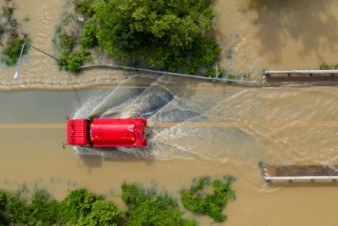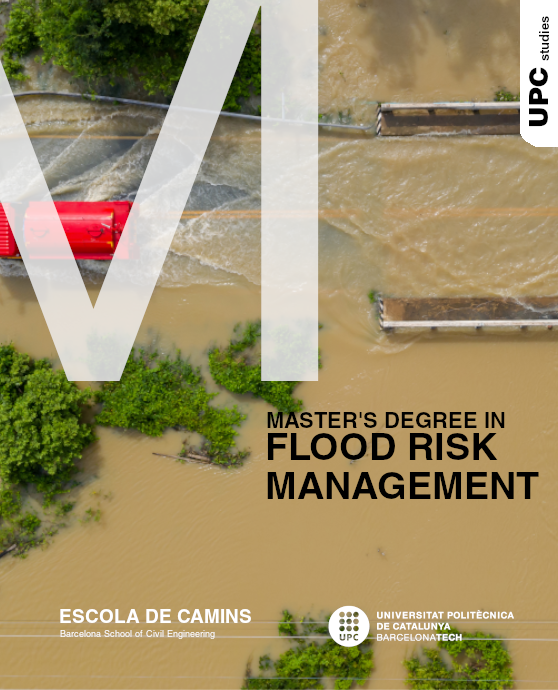Flood Risk Management

| Academic year starts in | September |
| Duration | 2 years |
| Study load | 120 ECTS (including the Master's Final Thesis) |
| Delivery | On-campus |
| Language | English |
| Places | 30 |
| Official degree | Erasmus Mundus Master's Degree in Flood Risk Management by the Universitat Politècnica de Catalunya (recorded in the Spanish Ministry of Education's degree register) |
| Participating universities | IHE Delft Institute for Water Education (Delft, the Netherlands-coordinator of the programme) Universitat Politècnica de Catalunya (Spain) Technische Universität Dresden (Germany) University of Ljubljana (Slovenia) |
| Fees | |
| EU scholarships | Please check the official website of this master's degree for more information on EU scholarships |
| Academic coordinator |
Admission requirements
The Flood Risk Management program has the following admission requirements:
- Proof that the applicant has successfully completed a first degree of higher education equivalent to a B.Sc. consisting of 180 credits according to the European Credit Transfer System (ECTS).
- A good final qualification, as demonstrated by a Grade Point Average (GPA) of at least B/B+ (US system) or a classification of at least 2nd class upper (UK system).
- A Bachelor's degree or comparable in one of the following disciplines: civil or environmental engineering, geosciences, environmental sciences, limnology, oceanography, geography, geology or natural resources or any other similar subject.
- Sufficient academic knowledge in mathematics and water-related subjects.
- Evidence of qualification in one of the internationally recognized English language tests. Find more information about English language requirements in the English language requirements section of the IHE Delft Institute for Water Education web site.
More information on the admission requirements.
Career opportunities
On completion of the course, students will be able to analyse the reciprocal relationships between physical systems, institutional frameworks and the socioeconomic environment, and identify future social and climatic pressures and needs and the consequent trends in system management; apply specific practical skills, such as the ability to identify the main physical processes in a given river basin or coastal zone and their interaction with the associated assets and receptors; identify the links between all issues related to flooding in order to apply an integrated approach to the sustainable management of floods using the best decision-making support tools; review scientific literature and carry out independent research; apply sophisticated hydroinformatics and modelling tools and best practices to address the problems of flood risk management; and occupy positions of responsibility as flood risk managers.
Learning objectives
Generic competencies
Generic competencies are the skills that graduates acquire regardless of the specific course or field of study. The generic competencies established by the UPC are capacity for innovation and entrepreneurship, sustainability and social commitment, knowledge of a foreign language (preferably English), teamwork and proper use of information resources.
The learning objectives (acquisition of knowledge) for the students include:
- A broad and cross-boundary scientific knowledge on flood risk management
- A comprehensive knowledge base and understanding of the current theory and practice relating to flooding and flood management
- The fundamental knowledge leading to the understanding of socio-economic issue related to flooding
- A broad scientific knowledge about conservation, restoration and management measures to overcome challenges imposed on water by humans and by climate change
- An extended knowledge on a basin-wide approach to flood risk management
Specific competencies
On completing this master's degree, students will be able to:
- Analyse the reciprocal relationships between the physical system, the institutional framework and the socio-economic environment, identifying future social and climatic pressures and needs and the consequent trends in system management
- Apply specific practical skills, such as identifying the major physical processes in a given river basin or coastal zone and their interaction with the associated assets and receptors
- Identify the links between all issues related to flooding in order to apply an integrated approach using the best tools to support decision making for the sustainable management of floods
- Review scientific literature and carry out independent research (such as writing a state of the art paper based on research and practice literature)
- Apply sophisticated hydroinformatics and modelling tools and best practices to address the problems of flood risk management; Occupy an independent and responsible position as a flood risk professional
- Communicate his/her knowledge and research results to the scientific and non-scientific communities (such as presenting papers/posters to scientific congresses, general lectures to policy makers and interested non-specialists)
- Acquire independently further knowledge and techniques, and operate in a team.
COURSES |
ECTS |
| Second year | |
| Fall semester | |
| 250910 Fluvial morphodynamics | 5 |
| 250911 Debris flow and flash flood: Risk, hazard, vulnerability & resilience concepts | 5 |
| 250912 Coastal flooding: Impacts, conflicts & risks | 3 |
| 250915 Implication of global warming on floods and droughts | 3 |
| 250916 Radar rainfall forecast, early warning systems | 4 |
| Spring semester | |
| 250903 Master's thesis | 30 |
Students enrolled at UPC for the Erasmus Mundus Master's Degree in Flood Risk Management can access the following information:
Choose the subjects you want to study and simulate how your schedule will be with the UPC Timetable Viewer:
The Master's Thesis is an original exercise to be done individually and presented and defended before a university pannel consisting in a project in the sphere of the specific computational mechanics synthesising and integrating the competences acquired on the course.
List of master's theses currently scheduled for public presentation:
Related links
Institutional information
Contact
- Admission:
erasmusregistration+frm@un-ihe.org - Information for enrolled students:
masters.camins@upc.edu

Share: